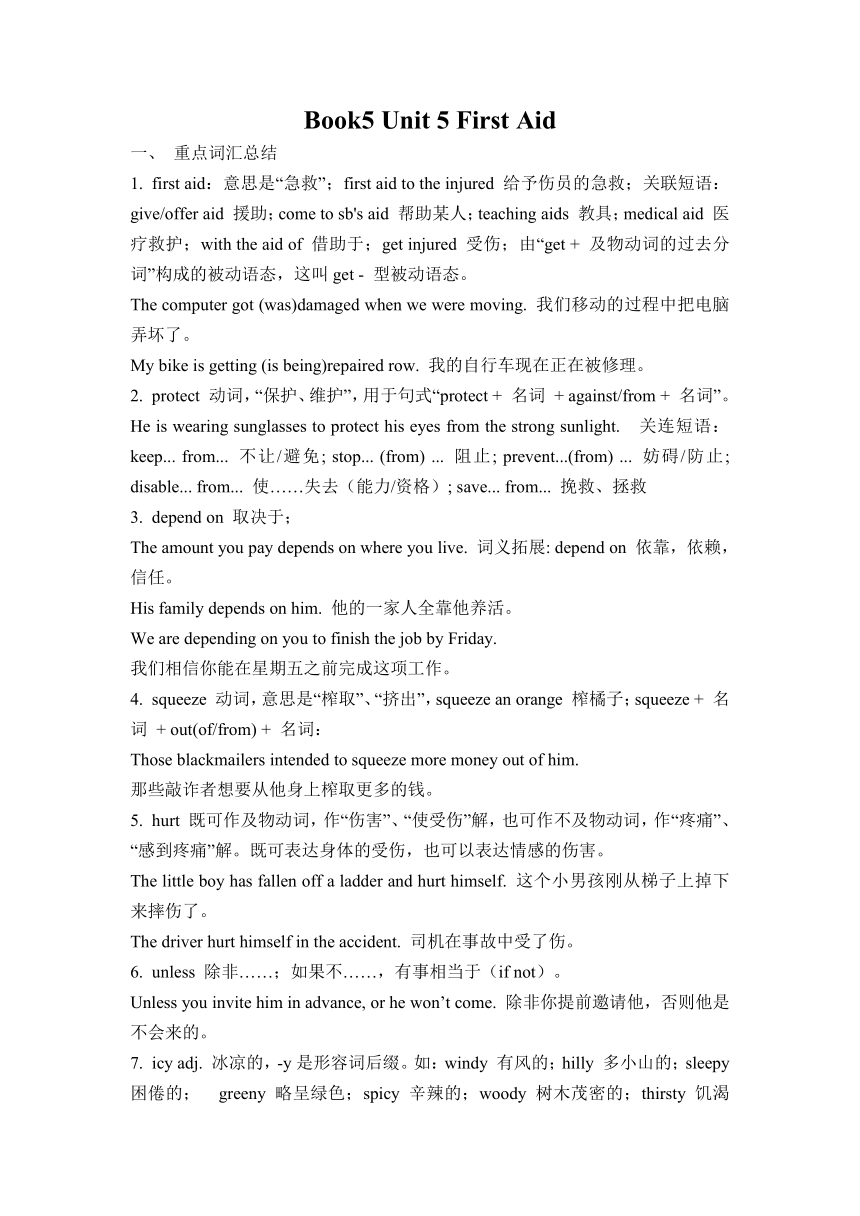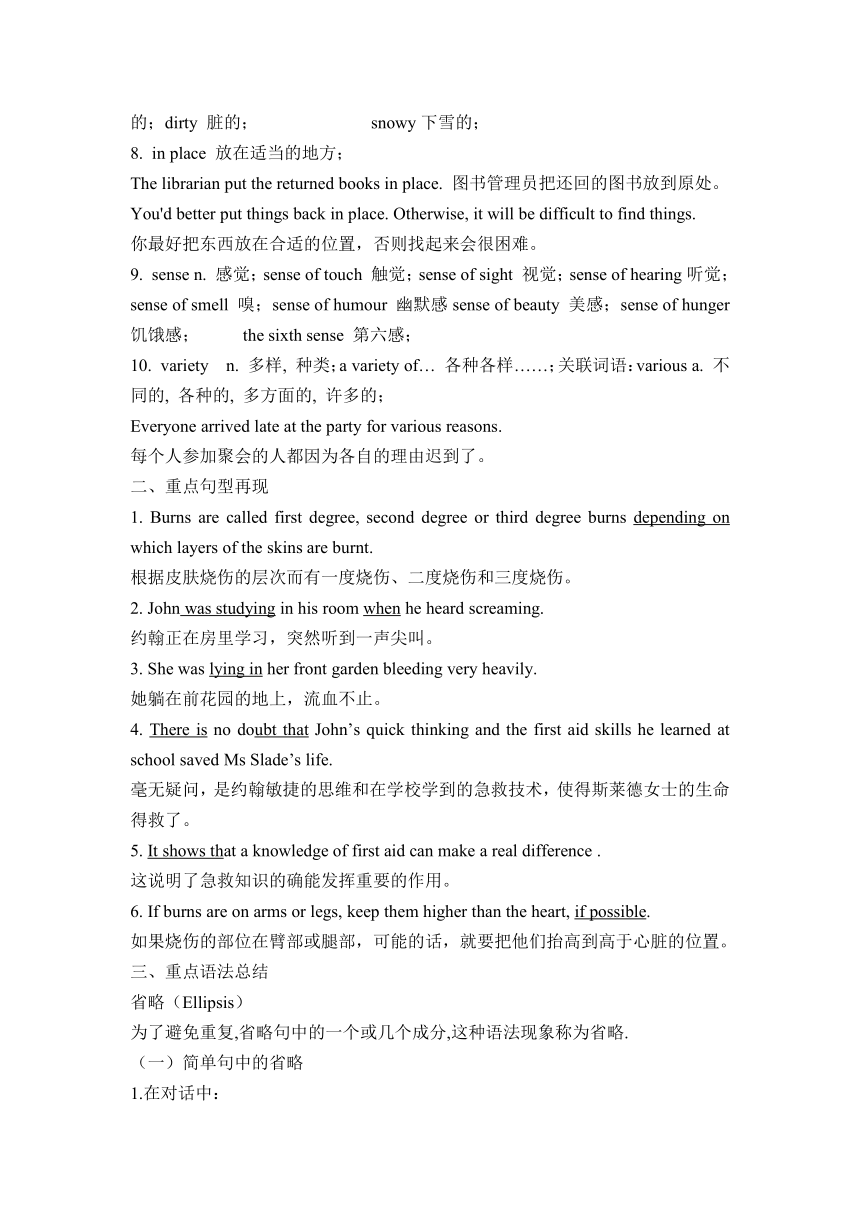人教版高中英语(教案)BOOK5 Unit 5 First Aid
文档属性
| 名称 | 人教版高中英语(教案)BOOK5 Unit 5 First Aid |

|
|
| 格式 | zip | ||
| 文件大小 | 16.7KB | ||
| 资源类型 | 教案 | ||
| 版本资源 | 人教版(新课程标准) | ||
| 科目 | 英语 | ||
| 更新时间 | 2016-08-11 10:08:55 | ||
图片预览


文档简介
Book5
Unit
5
First
Aid
重点词汇总结
first
aid:意思是“急救”;fi
( http: / / www.21cnjy.com )rst
aid
to
the
injured
给予伤员的急救;关联短语:give/offer
aid
援助;come
to
sb's
aid
帮助某人;teaching
aids
教具;medical
aid
医疗救护;with
the
aid
of
借助于;get
injured
受伤;由“get
+
及物动词的过去分词”构成的被动语态,这叫get
-
型被动语态。
The
computer
got
(was)damaged
when
we
were
moving.
我们移动的过程中把电脑弄坏了。
My
bike
is
getting
(is
being)repaired
row.
我的自行车现在正在被修理。
protect
动词,“保护、维护”,用于句式“protect
+
名词
+
against/from
+
名词”。
He
is
wearing
sunglas
( http: / / www.21cnjy.com )ses
to
protect
his
eyes
from
the
strong
sunlight.
关连短语:keep...
from...
不让/避免;
stop...
(from)
...
阻止;
prevent...(from)
...
妨碍/防止;
disable...
from...
使……失去(能力/资格);
save...
from...
挽救、拯救
depend
on
取决于;
The
amount
you
pay
de
( http: / / www.21cnjy.com )pends
on
where
you
live.
词义拓展:
depend
on
依靠,依赖,信任。
His
family
depends
on
him.
他的一家人全靠他养活。
We
are
depending
on
you
to
finish
the
job
by
Friday.
我们相信你能在星期五之前完成这项工作。
squeeze
动词,意思
( http: / / www.21cnjy.com )是“榨取”、“挤出”,squeeze
an
orange
榨橘子;squeeze
+
名词
+
out(of/from)
+
名词:
Those
blackmailers
intended
to
squeeze
more
money
out
of
him.
那些敲诈者想要从他身上榨取更多的钱。
hurt
既可作及物动词,作“伤害”、
( http: / / www.21cnjy.com )“使受伤”解,也可作不及物动词,作“疼痛”、“感到疼痛”解。既可表达身体的受伤,也可以表达情感的伤害。
The
little
boy
ha
( http: / / www.21cnjy.com )s
fallen
off
a
ladder
and
hurt
himself.
这个小男孩刚从梯子上掉下来摔伤了。
The
driver
hurt
himself
in
the
accident.
司机在事故中受了伤。
unless
除非……;如果不……,有事相当于(if
not)。
Unless
you
invite
( http: / / www.21cnjy.com )
him
in
advance,
or
he
won’t
come.
除非你提前邀请他,否则他是不会来的。
icy
adj.
冰凉的,-y是形容词后缀。
( http: / / www.21cnjy.com )如:windy
有风的;hilly
多小山的;sleepy
困倦的;
greeny
略呈绿色;spicy
辛辣的;woody
树木茂密的;thirsty
饥渴的;dirty
脏的;
snowy下雪的;
in
place
放在适当的地方;
The
librarian
put
the
returned
books
in
place.
图书管理员把还回的图书放到原处。
You'd
better
( http: / / www.21cnjy.com )put
things
back
in
place.
Otherwise,
it
will
be
difficult
to
find
things.
你最好把东西放在合适的位置,否则找起来会很困难。
sense
n.
感觉;
( http: / / www.21cnjy.com )sense
of
touch
触觉;sense
of
sight
视觉;sense
of
hearing听觉;
sense
of
smell
嗅;sense
of
humour
幽默感sense
of
beauty
美感;sense
of
hunger
饥饿感;
the
sixth
sense
第六感;
variety
n.
多样,
种类;
( http: / / www.21cnjy.com )a
variety
of…
各种各样……;关联词语:various
a.
不同的,
各种的,
多方面的,
许多的;
Everyone
arrived
late
at
the
party
for
various
reasons.
每个人参加聚会的人都因为各自的理由迟到了。
重点句型再现
1.
Burns
are
called
( http: / / www.21cnjy.com )
first
degree,
second
degree
or
third
degree
burns
depending
on
which
layers
of
the
skins
are
burnt.
根据皮肤烧伤的层次而有一度烧伤、二度烧伤和三度烧伤。
2.
John
was
studying
in
his
room
when
he
heard
screaming.
约翰正在房里学习,突然听到一声尖叫。
3.
She
was
lying
in
her
front
garden
bleeding
very
heavily.
她躺在前花园的地上,流血不止。
4.
There
is
no
do
( http: / / www.21cnjy.com )ubt
that
John’s
quick
thinking
and
the
first
aid
skills
he
learned
at
school
saved
Ms
Slade’s
life.
毫无疑问,是约翰敏捷的思维和在学校学到的急救技术,使得斯莱德女士的生命得救了。
5.
It
shows
that
a
k
( http: / / www.21cnjy.com )nowledge
of
first
aid
can
make
a
real
difference
.
这说明了急救知识的确能发挥重要的作用。
6.
If
burns
are
on
( http: / / www.21cnjy.com )
arms
or
legs,
keep
them
higher
than
the
heart,
if
possible.
如果烧伤的部位在臂部或腿部,可能的话,就要把他们抬高到高于心脏的位置。
重点语法总结
省略(Ellipsis)
为了避免重复,省略句中的一个或几个成分,这种语法现象称为省略.
(一)简单句中的省略
1.在对话中:
--How
is
your
mother
today
--(She
is
)
much
better.
在祈使句中:
(You)
open
the
door,please.
3.在感叹句中:
What
a
(good)
boy
(he
is)!
How
(hard)
they
are
working!
4.表示讲话人的意见和看法:
(It)
sounds
fine
to
me.
(It’s
a)
pity
you
couldn’t
come.
提问:
(Is
there)
anything
wrong
(Have
you)
found
the
bike
6.名词所有格修饰的名词若表示店铺,住宅,教堂或上下文已暗示或明确指出过的事物:
At
her
mother’s
(house)
she
passed
many
happy
days.
7.前面出现过的动词在下文再次出现时可以单纯使用不定式符号to:
I.
--Will
you
go
with
me
--Well,
I’d
like
to
(go
with
you).
II.
–Have
you
ever
been
to
the
seaside
--No,we
can’t
afford
to
(go
to
the
seaside).
(二)并列句中的省略
1.后面分句中与前面相同的部分常被省略:
She
was
poor
but
(she
was)
honest.
2.有时并列句中的省略部分出现在前面的分句中,看完最后一个分句才能掌握全句的完整意义。
Mary
can
(speak
English)and
Mary
ought
to
speak
English.
(三)惯用的省略结构
1.无动词祈使句,无主句祝愿句,这类句子往往用感叹号:
If
only
I
could
remember
his
name!
固定句型:
How/What
about
+
n/pron/-ing.
What
about
some
more
milk
3.Why
not
+省去to的动词不定式:
Why
not
go
at
once
(四)复合句中的省略
1.主句中的省略
1)主句的省略多见于句首,多用于口语中。
(It’s
a)
Pity
you
couldn’t
come.
2)在对话中答句省去整个主句只用从句。
--Shall
I
go
to
play
--If
you
like.(you
can
go
to
play).
2.宾语从句中的省略
1)由which,when,where,how和why
引导的宾语从句,可全部或部分省去,只保留引导词。
Please
pass
me
one
of
these
books,
I
don’t
care
which
(you
pass
me).
2)在I’m
afraid,I
thi
( http: / / www.21cnjy.com )nk,
I
believe,
I
hope,
I
guess等开头的作答句中,后面跟so
与
not
分别用于肯定或否定宾语是,宾语从句可省去。
--Do
you
think
it
will
rain
--I
hope
not
(that
it
will
not
rain).
3.状语从句中的省略
1)状语从句出现在句末时,一般都可以作句尾省略。
Coming
swimming
( http: / / www.21cnjy.com ) You
don’t
have
to
(coming
swimming)
if
you
don’t
want
to
(coming
swimming)
.
2)有时条件从句可以完全省去,只剩下主句。
I
would
have
come
yesterday
(if
I
had
wanted
to).
3)以as,than
引导的比较状语从句可以全部或部分省去:
After
half
a
hour,
she
become
quieter
(than
she
had
been.)
4)以when
,if等引导的状语从句若主句从句主语一致而且谓语是be;或者主语是it谓语是be,可以省去主语和be。
When
(it
is)
heated,
water
can
be
changed
into
vapor.
Unit
5
First
Aid
重点词汇总结
first
aid:意思是“急救”;fi
( http: / / www.21cnjy.com )rst
aid
to
the
injured
给予伤员的急救;关联短语:give/offer
aid
援助;come
to
sb's
aid
帮助某人;teaching
aids
教具;medical
aid
医疗救护;with
the
aid
of
借助于;get
injured
受伤;由“get
+
及物动词的过去分词”构成的被动语态,这叫get
-
型被动语态。
The
computer
got
(was)damaged
when
we
were
moving.
我们移动的过程中把电脑弄坏了。
My
bike
is
getting
(is
being)repaired
row.
我的自行车现在正在被修理。
protect
动词,“保护、维护”,用于句式“protect
+
名词
+
against/from
+
名词”。
He
is
wearing
sunglas
( http: / / www.21cnjy.com )ses
to
protect
his
eyes
from
the
strong
sunlight.
关连短语:keep...
from...
不让/避免;
stop...
(from)
...
阻止;
prevent...(from)
...
妨碍/防止;
disable...
from...
使……失去(能力/资格);
save...
from...
挽救、拯救
depend
on
取决于;
The
amount
you
pay
de
( http: / / www.21cnjy.com )pends
on
where
you
live.
词义拓展:
depend
on
依靠,依赖,信任。
His
family
depends
on
him.
他的一家人全靠他养活。
We
are
depending
on
you
to
finish
the
job
by
Friday.
我们相信你能在星期五之前完成这项工作。
squeeze
动词,意思
( http: / / www.21cnjy.com )是“榨取”、“挤出”,squeeze
an
orange
榨橘子;squeeze
+
名词
+
out(of/from)
+
名词:
Those
blackmailers
intended
to
squeeze
more
money
out
of
him.
那些敲诈者想要从他身上榨取更多的钱。
hurt
既可作及物动词,作“伤害”、
( http: / / www.21cnjy.com )“使受伤”解,也可作不及物动词,作“疼痛”、“感到疼痛”解。既可表达身体的受伤,也可以表达情感的伤害。
The
little
boy
ha
( http: / / www.21cnjy.com )s
fallen
off
a
ladder
and
hurt
himself.
这个小男孩刚从梯子上掉下来摔伤了。
The
driver
hurt
himself
in
the
accident.
司机在事故中受了伤。
unless
除非……;如果不……,有事相当于(if
not)。
Unless
you
invite
( http: / / www.21cnjy.com )
him
in
advance,
or
he
won’t
come.
除非你提前邀请他,否则他是不会来的。
icy
adj.
冰凉的,-y是形容词后缀。
( http: / / www.21cnjy.com )如:windy
有风的;hilly
多小山的;sleepy
困倦的;
greeny
略呈绿色;spicy
辛辣的;woody
树木茂密的;thirsty
饥渴的;dirty
脏的;
snowy下雪的;
in
place
放在适当的地方;
The
librarian
put
the
returned
books
in
place.
图书管理员把还回的图书放到原处。
You'd
better
( http: / / www.21cnjy.com )put
things
back
in
place.
Otherwise,
it
will
be
difficult
to
find
things.
你最好把东西放在合适的位置,否则找起来会很困难。
sense
n.
感觉;
( http: / / www.21cnjy.com )sense
of
touch
触觉;sense
of
sight
视觉;sense
of
hearing听觉;
sense
of
smell
嗅;sense
of
humour
幽默感sense
of
beauty
美感;sense
of
hunger
饥饿感;
the
sixth
sense
第六感;
variety
n.
多样,
种类;
( http: / / www.21cnjy.com )a
variety
of…
各种各样……;关联词语:various
a.
不同的,
各种的,
多方面的,
许多的;
Everyone
arrived
late
at
the
party
for
various
reasons.
每个人参加聚会的人都因为各自的理由迟到了。
重点句型再现
1.
Burns
are
called
( http: / / www.21cnjy.com )
first
degree,
second
degree
or
third
degree
burns
depending
on
which
layers
of
the
skins
are
burnt.
根据皮肤烧伤的层次而有一度烧伤、二度烧伤和三度烧伤。
2.
John
was
studying
in
his
room
when
he
heard
screaming.
约翰正在房里学习,突然听到一声尖叫。
3.
She
was
lying
in
her
front
garden
bleeding
very
heavily.
她躺在前花园的地上,流血不止。
4.
There
is
no
do
( http: / / www.21cnjy.com )ubt
that
John’s
quick
thinking
and
the
first
aid
skills
he
learned
at
school
saved
Ms
Slade’s
life.
毫无疑问,是约翰敏捷的思维和在学校学到的急救技术,使得斯莱德女士的生命得救了。
5.
It
shows
that
a
k
( http: / / www.21cnjy.com )nowledge
of
first
aid
can
make
a
real
difference
.
这说明了急救知识的确能发挥重要的作用。
6.
If
burns
are
on
( http: / / www.21cnjy.com )
arms
or
legs,
keep
them
higher
than
the
heart,
if
possible.
如果烧伤的部位在臂部或腿部,可能的话,就要把他们抬高到高于心脏的位置。
重点语法总结
省略(Ellipsis)
为了避免重复,省略句中的一个或几个成分,这种语法现象称为省略.
(一)简单句中的省略
1.在对话中:
--How
is
your
mother
today
--(She
is
)
much
better.
在祈使句中:
(You)
open
the
door,please.
3.在感叹句中:
What
a
(good)
boy
(he
is)!
How
(hard)
they
are
working!
4.表示讲话人的意见和看法:
(It)
sounds
fine
to
me.
(It’s
a)
pity
you
couldn’t
come.
提问:
(Is
there)
anything
wrong
(Have
you)
found
the
bike
6.名词所有格修饰的名词若表示店铺,住宅,教堂或上下文已暗示或明确指出过的事物:
At
her
mother’s
(house)
she
passed
many
happy
days.
7.前面出现过的动词在下文再次出现时可以单纯使用不定式符号to:
I.
--Will
you
go
with
me
--Well,
I’d
like
to
(go
with
you).
II.
–Have
you
ever
been
to
the
seaside
--No,we
can’t
afford
to
(go
to
the
seaside).
(二)并列句中的省略
1.后面分句中与前面相同的部分常被省略:
She
was
poor
but
(she
was)
honest.
2.有时并列句中的省略部分出现在前面的分句中,看完最后一个分句才能掌握全句的完整意义。
Mary
can
(speak
English)and
Mary
ought
to
speak
English.
(三)惯用的省略结构
1.无动词祈使句,无主句祝愿句,这类句子往往用感叹号:
If
only
I
could
remember
his
name!
固定句型:
How/What
about
+
n/pron/-ing.
What
about
some
more
milk
3.Why
not
+省去to的动词不定式:
Why
not
go
at
once
(四)复合句中的省略
1.主句中的省略
1)主句的省略多见于句首,多用于口语中。
(It’s
a)
Pity
you
couldn’t
come.
2)在对话中答句省去整个主句只用从句。
--Shall
I
go
to
play
--If
you
like.(you
can
go
to
play).
2.宾语从句中的省略
1)由which,when,where,how和why
引导的宾语从句,可全部或部分省去,只保留引导词。
Please
pass
me
one
of
these
books,
I
don’t
care
which
(you
pass
me).
2)在I’m
afraid,I
thi
( http: / / www.21cnjy.com )nk,
I
believe,
I
hope,
I
guess等开头的作答句中,后面跟so
与
not
分别用于肯定或否定宾语是,宾语从句可省去。
--Do
you
think
it
will
rain
--I
hope
not
(that
it
will
not
rain).
3.状语从句中的省略
1)状语从句出现在句末时,一般都可以作句尾省略。
Coming
swimming
( http: / / www.21cnjy.com ) You
don’t
have
to
(coming
swimming)
if
you
don’t
want
to
(coming
swimming)
.
2)有时条件从句可以完全省去,只剩下主句。
I
would
have
come
yesterday
(if
I
had
wanted
to).
3)以as,than
引导的比较状语从句可以全部或部分省去:
After
half
a
hour,
she
become
quieter
(than
she
had
been.)
4)以when
,if等引导的状语从句若主句从句主语一致而且谓语是be;或者主语是it谓语是be,可以省去主语和be。
When
(it
is)
heated,
water
can
be
changed
into
vapor.
